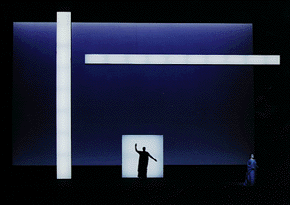 It's wonderful to experience Lohengrin again at the MET, and even more wonderful to have a chance to re-explore Robert Wilson's unusual take on this romantic Wagner opera. I had completely forgotten the off-white curtain with the single blue wing on it that greeets the audience upon arriving in the auditorium (next year, with Peter Gelb introducing so many "new" operas, we may never get to see the Gold Curtain!), and the tremendous impact that this production can have on those willing to take a gamble on it. Back in 1998, I thought that Mr. Wilson's Lohengrin was a totally unique look for the MET. Since then, I have observed that he has pretty much applied a similar formula to his Parsifal in Los Angeles, and his Ring of the Nibelung at the Paris Opera.
It's wonderful to experience Lohengrin again at the MET, and even more wonderful to have a chance to re-explore Robert Wilson's unusual take on this romantic Wagner opera. I had completely forgotten the off-white curtain with the single blue wing on it that greeets the audience upon arriving in the auditorium (next year, with Peter Gelb introducing so many "new" operas, we may never get to see the Gold Curtain!), and the tremendous impact that this production can have on those willing to take a gamble on it. Back in 1998, I thought that Mr. Wilson's Lohengrin was a totally unique look for the MET. Since then, I have observed that he has pretty much applied a similar formula to his Parsifal in Los Angeles, and his Ring of the Nibelung at the Paris Opera.The staging has remained pretty much the same: a backdrop of ever-changing hues of blues, and white neon-like monoliths that occasionally invade the stage in order to signal the beginnings or endings of scenes. Thankfully, the conclusion of Act II, involving the character of Ortrud and a crimson red curtain (to my mind, one of the master strokes of this production), remains intact from the first time I saw it.
One aspect that has been eliminated from the production is the rhythmic, but awkward hand-movements that everyone: critics, audience and, in particular, performers alike, complained about back when the production was new. Now, the characters move about the scenic space in a glacial pace, which at times is interrupted by poses which remind one of Kabuki theater. Not everyone is cut out to be a Robert Wilson performer. Some like Karita Mattila (Elsa), Eike Wilm Schulte (The Herald), and Luana DeVol (Ortrud) come naturally to it. Others like Ben Heppner (Lohengrin) struggle not to appear self-conscious.
Vocally, it was a strong evening. All the principals rose to the ocassion. The only weak link was Andrew Greenan who was the last-minute King Henry replacement for Stephen West, who was ill. Both Karita Matilla and Ben Heppner were perfect and made some lovely ethereal sounds as the lovers. Meanwhile, Luana DeVol and Richard Paul Fink as Ortrud and Telramund were evil and dastardly in their respective roles.
I must say that Philippe Auguin led a carefully crafted reading of the score -- his baton marking clear metronomic beats during the Act I prelude. Not the most inspiring of conductors, but definitely easy to follow. He also appears to be a jovial fellow, and during his curtain call he even turned to acknowledge the work of the chorus, who sang brilliantly. But I also have to report that when the cat's away, the mice will indeed play: there were some awful sounds coming from the "banda" backstage. Let's hope this gets fixed by the next performances, and especially for the broadcast.
Overall, this Lohengrin is a strong revival of one of the most important productions that the MET has staged in years. Do not, I repeat: do not miss it.
No comments:
Post a Comment